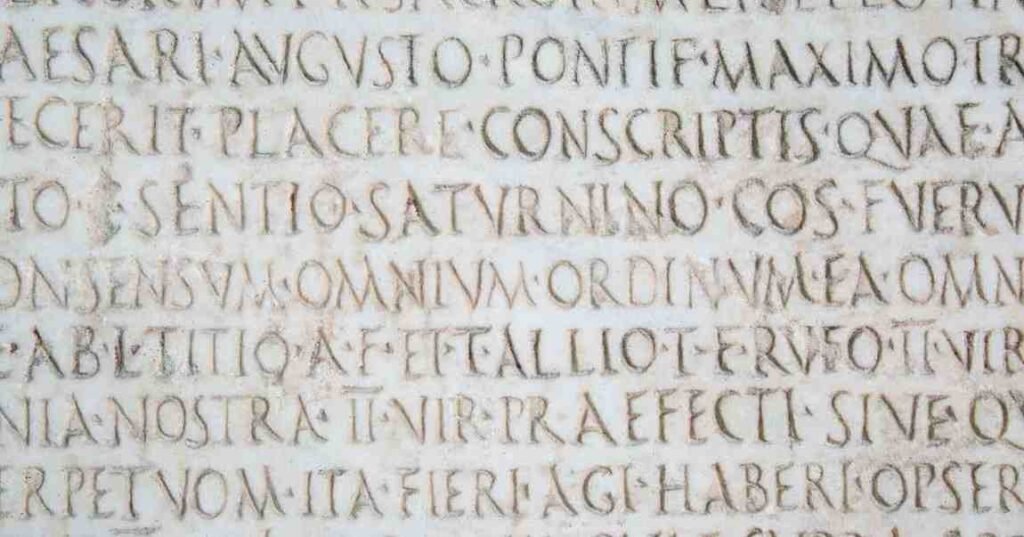What Language Did the Romans Speak?
The Importance of Language in Roman History
The question “what language did the Romans speak” is central to understanding Roman history and culture. The Romans primarily spoke Latin, a language that would come to dominate much of Europe for centuries. Latin was the foundation of governance, education, and literature during the Roman Empire. It provided a shared tongue among diverse provinces, aiding in unifying the expansive empire. Additionally, Latin evolved into the Romance languages, such as Italian, Spanish, and French, demonstrating its enduring influence. By exploring “what language did the Romans speak,” we uncover the pivotal role language played in shaping communication and cultural identity in ancient Rome.
How Latin Influenced Future Civilizations
Understanding “what language did the Romans speak” also reveals Latin’s profound impact on later civilizations. Beyond the Roman Empire, Latin became the language of the Church, science, and academia during the Middle Ages and Renaissance. Scholars throughout Europe relied on it to share knowledge, ensuring the language’s survival long after Rome’s decline. The legal and political terminologies of the Roman era, rooted in Latin, continue to influence systems worldwide. By grasping “what language did the Romans speak,” we can appreciate how the linguistic choices of an ancient empire shaped modern societies across the globe.
Must Read: Are garter snakes poisonous? Discover the hidden danger!
The Primary Language of the Romans
Origins of the Latin Language
The origins of the Latin language trace back to the Italic peoples who inhabited the region of Latium in central Italy during antiquity. Over time, Latin evolved and came to dominate as the primary language of the Roman Empire. When considering “what language did the Romans speak,” Latin emerges as not just a means of communication, but a tool for unifying the diverse population of the expanding empire. Its structure and vocabulary were shaped by interactions with neighboring cultures, such as the Etruscans and Greeks, resulting in a rich linguistic foundation.
How Latin Shaped Roman Society and Culture
- Administration and Governance: Latin served as the official language of Roman law, governance, and administration, enabling efficient management across the vast territories of the Roman Empire.
- Education and Literature: The development of a standardized written form of Latin allowed for the creation of an enduring body of Roman literature, as seen in works by authors like Virgil, Cicero, and Ovid. It also came the medium of education for the nobility.
- Religion and Rituals: Latin was deeply embedded in religious practices, forming the language of prayers, ceremonies, and later, the Christian Church, which carried it forward as a sacred tongue.
- Social Cohesion: By adopting Latin as a unifying language, the Romans fostered communication and integration among disparate cultures within their empire, promoting a shared identity.
- Cultural Transmission: Latin acted as a bridge for cultural and technological exchange, influencing art, architecture, and philosophy throughout Roman society.
- Legacy and Linguistic Influence: The widespread use of Latin laid the foundation for the Romance languages, such as Italian, French, Spanish, Portuguese, and Romanian, which continue to be spoken around the world today.
Did the Romans Speak Other Languages?

Regional cants and Multilingualism in the Roman Empire
While Latin was the primary language of the Roman Empire, the linguistic landscape was far more diverse than it may appear. Within the empire’s vast territories, regional dialects and indigenous languages thrived alongside Latin. Local populations often retained their native tongues, creating a multilingual environment where Latin coexisted with Celtic, Etruscan, Punic, and other languages. This diversity highlights that the answer to “what language did the Romans speak” depends on context, as both classical Latin and regional languages contributed to the rich tapestry of Roman communication. Multilingualism allowed for adaptability, enabling efficient governance across diverse provinces.
The Role of Greek in Roman Communication
- Greek played a significant role in the Roman Empire, especially in the eastern provinces where it was widely spoken and understood.
- For educated Romans, Greek was often the language of culture, philosophy, and science, influencing intellectual pursuits and elite communication.
- Greek served as a lingua franca in many parts of the empire, making it a crucial tool for diplomacy and trade.
- The significance of Greek further emphasizes the complexity behind the question, “what language did the Romans speak,” as Greek complemented Latin in many official and social contexts.
- Bilingualism was common among Roman elites, who navigated both Latin and Greek painlessly, reflecting the multilingual nature of their civilization.
- Understanding “what language did the Romans speak” also requires considering how Greek was integrated into fields like literature, art, and education.
This concurrence of languages underscores the rigidity of Roman communication and the artistic blending that defined the conglomerate.
The elaboration of Latin From Classical to Vulgar
Differences Between Classical Latin and Vulgar Latin
When exploring “what language did the Romans speak,” it becomes essential to differentiate between Classical Latin and Vulgar Latin. Classical Latin was the formal, written language used in literature, rhetoric, and official documents. It adhered to strict grammatical rules and a sophisticated vocabulary, making it the language of the elite. On the other hand, Vulgar Latin was the colloquial speech of everyday Romans, characterized by simpler grammar, regional variations, and less rigid standards. This spoken form evolved over time, eventually diverging from its predecessor and laying the groundwork for linguistic change across the empire.
How Vulgar Latin Gave Birth to the Romance Languages
The study of “what language did the Romans speak” reveals how Vulgar Latin served as the foundation for the Romance languages. As the Roman Empire expanded, Vulgar Latin spread and blended with local dialects, creating regional linguistic differences. Over centuries, these spoken variations developed into distinct languages, such as Spanish, French, Italian, and Portuguese. The influence of Vulgar Latin is evident in vocabulary, pronunciation, and grammatical structures found in these modern languages. This linguistic transformation underscores the adaptability of the Roman language and its lasting legacy in shaping the linguistic landscape of Europe.
The Spread of Latin Across the Roman Empire
How Conquests Helped Spread the Roman Language
The Roman Empire’s extensive conquests played a pivotal role in spreading Latin, the language spoken by the Romans. Through military campaigns and the establishment of colonies, the use of Latin was introduced to vast territories across Europe, North Africa, and parts of the Middle East. Latin became the foundation for communication, governance, and culture in conquered regions. By ensuring Latin’s adoption among local elites and incorporating it into legal and administrative systems, the Romans successfully embedded their language into daily life. This widespread use of Latin answers the enduring question, “what language did the Romans speak,” showcasing its central role in unifying the empire.
The Adaptation of Latin in Conquered Regions
When Latin was introduced to conquered regions, it often blended with local languages, creating unique linguistic variations. Over time, these variations evolved into the Romance languages we know today, such as Spanish, French, and Italian. The adaptability of Latin enabled it to permeate diverse cultures and remain a common thread across the Roman Empire. Local populations merged their native tongues with elements of Latin, reflecting the dynamic interaction between Roman and regional identities. This process highlights how “what language did the Romans speak” became a pivotal question for understanding the origins of modern European languages and the enduring influence of Roman linguistic practices.
The Decline of Latin: A Lost Legacy
Why Latin Faded as a Spoken Language
The decline of Latin as a spoken language was a gradual process influenced by political, social, and cultural changes. After the fall of the Western Roman Empire, the unified structure that maintained Latin’s dominance began to scrap. Regional cants evolved due to limited communication and the decline of centralized authority, leading to the emergence of new languages. Furthermore, the spread of Christianity introduced ecclesiastical Latin, which diverged from everyday usage. Though “what language did the Romans speak” was once an essential question in understanding ancient history, its spoken use diminished as regional identities grew stronger across Europe.
The Enduring Influence of Latin in Modern Times
Despite its decline, Latin’s influence remains deeply embedded in modern civilization. Numerous European languages, including Spanish, French, and Italian, are direct descendants of Latin, showcasing its enduring heritage. Furthermore, Latin is used in specialized fields like science, law, and medicine, underscoring its intellectual and cultural significance. “What language did the Romans speak” continues to be a key question in academic discourse, connecting scholars to the universal roots of language. Even today, Latin phrases persist in modern vocabulary, reminding us of its integral role in shaping communication and knowledge across centuries.
For more informative and interesting articles visit: royallmagazine.com
Why Understanding Roman Language Matters Today
The question of “what language did the Romans speak” is more than a historical inquiry; it is a gateway to understanding the foundations of modern civilization. Latin, the language of the Romans, profoundly influenced the development of European languages, law, and education systems. By studying Latin and asking “what language did the Romans speak,” scholars can trace the evolution of ideas and words that shaped modern communication and knowledge. This connection highlights the importance of preserving and exploring the linguistic heritage of the Roman Empire.
Beyond linguistics, understanding “what language did the Romans speak” holds cultural and intellectual value. Latin-based terminology is prevalent in fields such as law, medicine, and science, ensuring its relevance in contemporary professional practices. Rediscovering “what language did the Romans speak” helps bridge the gap between ancient knowledge and present-day innovations. Ultimately, it offers timeless insight into the shared history of humanity.
Conclusion: The Legacy of the Roman Language
The legacy of the Roman language endures powerfully, transcending time and influencing modern society in countless ways. Exploring “what language did the Romans speak” reveals the essential role Latin played as the linguistic foundation of the Roman Empire and its profound impact on the cultural and intellectual framework of Western civilization. “What language did the Romans speak” is a question that uncovers the roots of many modern languages, such as Italian, French, and Spanish, and highlights Latin’s continued relevance in specialized fields like law, medicine, and science. By understanding “what language did the Romans speak,” we gain appreciation for the connection between ancient traditions and contemporary knowledge, enriching our grasp of humanity’s shared history and its ongoing evolution.



